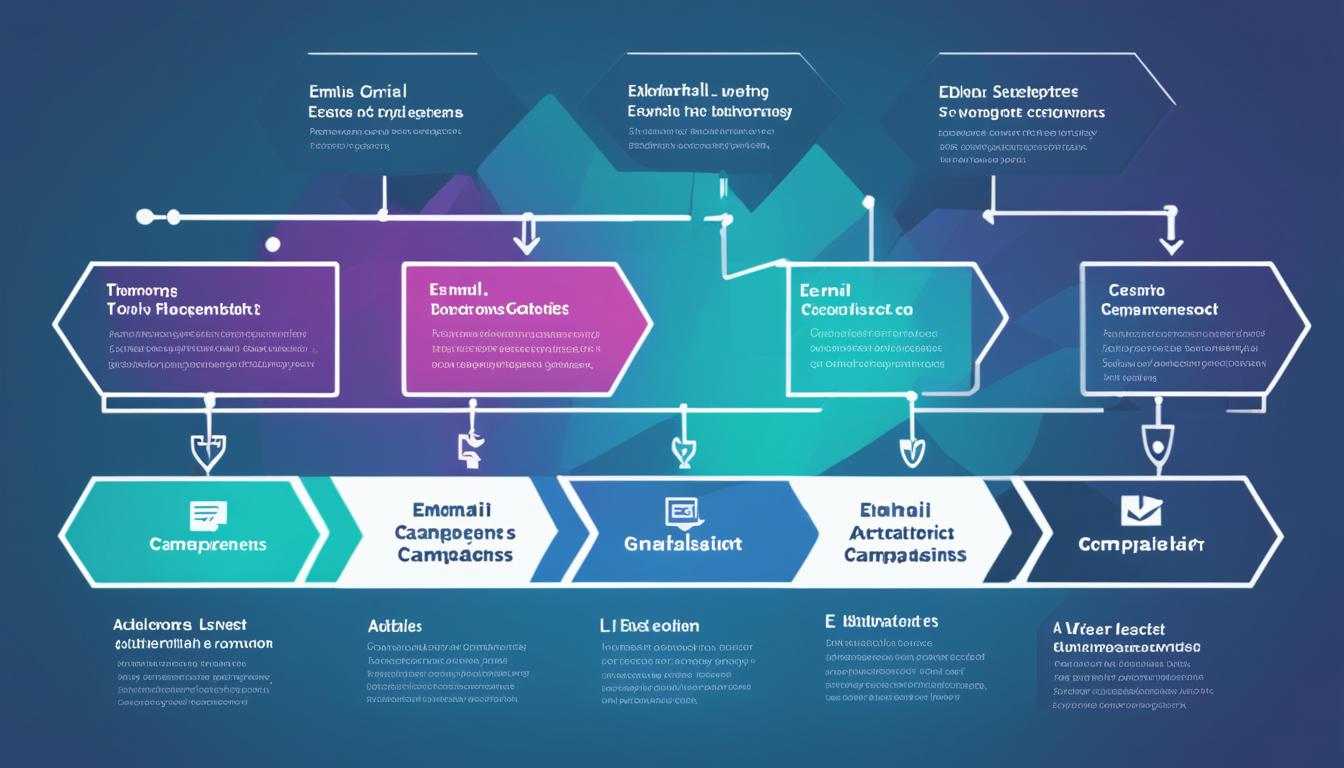Welcome to our comprehensive guide on travel agency marketing strategies in the year 2024. In this section, we will delve into the importance of digital marketing for travel agencies and the benefits of implementing personalized marketing campaigns to attract and engage potential travelers.
Key Takeaways:
- Digital marketing is crucial for the success of travel agencies in 2024.
- Personalized marketing campaigns help to attract and engage potential travelers.
- Understanding the latest marketing strategies and trends is essential to stay competitive in the travel industry.
- Building trust and credibility through effective marketing strategies is crucial for travel agencies.
- Implementing a comprehensive marketing strategy will help travel agencies thrive in the competitive market.
Defining Your Niche and Ideal Customer
In the highly competitive travel industry, finding your niche and understanding your ideal customer is key to standing out from the crowd and attracting the right audience. Defining your niche involves focusing on a specific segment of the travel market and tailoring your services to meet their unique needs and preferences. This section will explore the various niche categories that travel agencies can specialize in and how ideal customer profiling plays a vital role in shaping your marketing strategy.
Finding Your Travel Agency Niche
When determining your niche, consider the specific destinations, types of travel experiences, demographics, and special interests that set your agency apart from others. By honing in on a specialized offering, you can position yourself as an expert in that particular area and leverage it to attract customers who are seeking precisely what your agency has to offer.
Here are a few examples of travel agency niches:
- Adventure travel for adrenaline junkies
- Luxury travel for discerning travelers
- Ecotourism for sustainable and responsible travelers
- Family-friendly vacations for parents and children
- Group travel for corporate teams or social communities
By identifying your unique niche, you can effectively differentiate yourself from other travel agencies and create a strong brand identity that resonates with your target audience.
Ideal Customer Profiling
Understanding your ideal customer is essential for crafting compelling marketing messages and designing personalized travel experiences. Ideal customer profiling is the process of creating in-depth personas that represent your target audience. These personas incorporate demographic information, preferences, pain points, and motivations.
By analyzing your ideal customers’ characteristics, you can tailor your marketing efforts to resonate with their needs. For example, if your ideal customer is a budget-conscious backpacker, you can focus on promoting affordable accommodations, low-cost transportation options, and off-the-beaten-path destinations.
To create effective ideal customer profiles, consider gathering data through surveys, interviews, and market research. Look for patterns and commonalities among your existing customers to identify trends and insights that can inform your marketing strategy.
Here is an example of an ideal customer profile for a luxury travel agency:
| Persona | Demographics | Preferences | Pain Points | Motivations |
|---|---|---|---|---|
| Lucy the Luxe Traveler | Age: 40-55 Income: High Education: College or above Location: Urban areas |
5-star accommodations Fine dining experiences Exclusive access to attractions |
High prices Time constraints Ensuring quality and exclusivity |
Unforgettable and unique travel experiences Showcasing wealth and social status Relaxation and pampering |
By using ideal customer profiles like this one, you can tailor your marketing messages, create targeted advertising campaigns, and design customized travel packages that align with your ideal customers’ desires and aspirations.
This image represents the diverse niches within the travel industry, ranging from adventure travel to luxury experiences.
Developing a Comprehensive Marketing Strategy
A well-defined marketing strategy is essential for the success of any travel agency. By creating a comprehensive plan, travel agencies can effectively reach their target audience, promote their offerings, and drive bookings. In this section, we will explore the key components of a successful marketing strategy that will elevate your travel agency’s visibility and generate desirable results.
1. Set Clear Marketing Goals and Objectives
Before embarking on any marketing campaign, it is essential to establish clear goals and objectives. These goals will serve as a roadmap for your marketing efforts, guiding you towards the desired outcomes. Whether it’s increasing brand awareness, boosting bookings for a specific destination, or attracting a new customer segment, defining your goals will help you set measurable targets and track your progress.
2. Select the Appropriate Advertising Platforms
Choosing the right advertising platforms is crucial for reaching and engaging your target audience effectively. Consider your defined target market and their preferred channels of communication. In today’s digital age, leveraging both digital and traditional platforms can maximize your visibility. From social media platforms to travel magazines, explore various advertising options to amplify your marketing message.
3. Utilize Effective Marketing Tools
Employing the right marketing tools can optimize your marketing efforts and provide valuable insights into consumer behavior. Tools such as customer relationship management (CRM) systems, email marketing platforms, and website analytics can help you streamline your campaigns, personalize your messaging, and track the performance of your marketing initiatives.
4. Define and Understand Your Target Market
To create tailored marketing campaigns, it is crucial to define and understand your target market. Conduct market research to gain insights into your audience’s demographics, interests, pain points, and preferences. This information will enable you to craft messages that resonate with your potential customers, increasing the effectiveness of your marketing efforts.
5. Employ a Mix of Digital and Traditional Tactics
In today’s digital landscape, travel agencies must leverage a mix of digital and traditional marketing tactics to reach a wide audience. Digital tactics such as search engine optimization (SEO), social media marketing, content marketing, and influencer collaborations can expand your online presence. However, traditional tactics like print advertising, direct mail, and participation in travel trade shows can also be effective in reaching specific customer segments.
6. Implement Tracking and Measurement Methods
Tracking and measuring the performance of your marketing efforts is crucial for refining your strategies and maximizing your return on investment (ROI). Utilize tools like Google Analytics to monitor website traffic, conversion rates, and user behavior. Additionally, implement tracking mechanisms for your online advertising campaigns and measure engagement and conversions. By analyzing these metrics, you can identify areas of improvement and optimize future marketing initiatives.
By developing a comprehensive marketing strategy that aligns with your agency’s goals and target market, utilizing the right advertising platforms and tools, and continuously tracking and measuring your efforts, you can drive visibility and success for your travel agency.
| Marketing Components | Description |
|---|---|
| Clear Marketing Goals and Objectives | Establish measurable goals and objectives to steer your marketing efforts. |
| Appropriate Advertising Platforms | Select the platforms that best reach and engage your target audience. |
| Effective Marketing Tools | Utilize tools that streamline campaigns, personalize messaging, and provide valuable insights. |
| Defined Target Market | Conduct market research to understand your audience’s demographics and preferences. |
| Digital and Traditional Tactics | Leverage both digital and traditional marketing tactics to reach a wide audience. |
| Tracking and Measurement Methods | Monitor and measure the performance of your marketing initiatives to optimize future strategies. |
Mastering Marketing Channels in 2024
As travel agencies strive to attract and connect with potential travelers, mastering various marketing channels is paramount. In this section, we’ll explore the importance of leveraging different platforms and strategies to reach travelers effectively in 2024.
Travel Agency Website: Creating a Visually Appealing and User-Friendly Online Presence
A visually appealing and user-friendly website is the foundation of any successful travel agency’s online presence. By investing in a well-designed website, travel agencies can captivate potential travelers’ attention and showcase their offerings in an engaging manner.
Search Engine Optimization (SEO): Boosting Online Visibility
Implementing effective search engine optimization techniques is crucial for travel agencies to improve their online visibility. By optimizing website content with relevant keywords, meta tags, and backlinks, travel agencies can increase their chances of appearing in search engine results, driving organic traffic to their websites.
Social Media Marketing: Engaging Content and Targeted Advertising
Social media platforms provide travel agencies with an opportunity to reach a wide audience and engage potential travelers through compelling content. By leveraging social media marketing, travel agencies can showcase destinations, share travel tips, and run targeted advertising campaigns to reach their desired demographic.
Email Marketing: Reaching and Retaining Customers
Email marketing continues to be an effective strategy for travel agencies to reach and retain customers. By building a database of interested travelers and sending personalized email campaigns, travel agencies can nurture relationships, promote special offers, and encourage repeat bookings.
Content Marketing: Creating Compelling Blogs and Videos
Creating and sharing valuable travel-related content through blogs and videos is an effective way for travel agencies to connect with potential travelers. By publishing informative and engaging content that resonates with their target audience, travel agencies can establish themselves as reputable sources of information and build trust with potential customers.
Influencer Marketing: Partnering with Industry Experts
Influencer marketing continues to be a powerful tool for travel agencies to expand their reach and connect with travelers. By partnering with influencers in the travel industry who have a genuine following, travel agencies can leverage their influence to promote their services, destinations, and travel experiences.
Mobile App Strategy: Catering to the Growing Number of Travelers Using Smartphones
In today’s digital era, travelers increasingly rely on their smartphones for trip planning and bookings. Implementing a mobile app strategy allows travel agencies to cater to this growing market segment. By offering a seamless and user-friendly mobile app experience, travel agencies can enhance customer convenience and engagement.
| Marketing Channel | Benefits |
|---|---|
| Travel Agency Website | 1. Showcasing offerings effectively 2. Creating a positive online brand image 3. Converting website visitors into customers |
| Search Engine Optimization (SEO) | 1. Improving online visibility and organic traffic 2. Increasing the chances of appearing in search engine results |
| Social Media Marketing | 1. Engaging potential travelers through compelling content 2. Running targeted advertising campaigns |
| Email Marketing | 1. Reaching and retaining customers through personalized campaigns 2. Promoting special offers and encouraging repeat bookings |
| Content Marketing | 1. Establishing credibility and trust 2. Attracting potential travelers through valuable and engaging content |
Customer Testimonials and Success Stories
Building trust and credibility is crucial in the travel industry. Potential travelers often seek reassurance before making their final booking decisions. This is where customer testimonials and success stories play a powerful role. By showcasing the experiences and satisfaction of past customers, travel agencies can provide social proof, influencing potential travelers to choose their services and offerings.
Travel agency testimonials can be featured on various online platforms, including websites, social media, and email campaigns. Consider placing prominent testimonials on the homepage of your website to immediately grab the attention of visitors. Create a dedicated page that gathers multiple customer testimonials to provide a comprehensive overview of the positive experiences your agency has delivered.
In addition to written testimonials, including photos or videos along with the customer’s story can enhance their credibility. Visual content helps potential travelers connect with the experiences and emotions shared by previous customers. Videos, in particular, can create a more personal and authentic connection, increasing the impact of testimonials.
Consider the example below of how testimonials and success stories can be effectively displayed on a travel agency website:
| Testimonial | Name | Destination |
|---|---|---|
| “I had an unforgettable experience with XYZ Travel Agency. They went above and beyond to ensure every aspect of my trip was perfect.” | Sarah Johnson | Maldives |
| “Thanks to ABC Travel Agency, I had the most incredible adventure in South Africa. Their attention to detail and personalized recommendations made the trip truly remarkable.” | Michael Davis | South Africa |
| “I cannot recommend DEF Travel Agency enough. They helped me plan a dream vacation to Italy, and every moment exceeded my expectations.” | Emily Thompson | Italy |
Testimonials can also be leveraged on social media platforms. Share customer stories and experiences on your agency’s social media accounts. Encourage customers to leave reviews and comments on posts, further strengthening your agency’s reputation and engagement with potential travelers.
Another effective way to utilize testimonials is through email marketing campaigns. Include snippets of positive customer feedback to entice recipients and encourage them to engage with your agency. Additionally, consider a dedicated email campaign that highlights success stories and invites recipients to learn more about the transformative travel experiences your agency can provide.
Remember, genuine and authentic testimonials have a significant impact on potential travelers. They provide social proof, enhance credibility, and demonstrate the value and quality of your agency’s services. Incorporate customer testimonials and success stories strategically across your marketing channels to build trust and attract more travelers.
Future Trends for the Travel Industry
The travel industry is constantly evolving, shaped by changing consumer behaviors and emerging technologies. To remain competitive in this dynamic landscape, travel agencies must proactively adapt and embrace future trends. In this section, we’ll explore some of the key trends that are expected to impact the travel industry in the coming years.
Sustainable Travel
As travelers become more environmentally conscious, the demand for sustainable travel experiences is on the rise. Travel agencies can take advantage of this trend by offering eco-friendly destinations, accommodations, and transportation options. By promoting sustainable practices and partnering with eco-conscious suppliers, agencies can cater to the growing market segment of environmentally conscious travelers.
Virtual Reality in Travel
The integration of virtual reality (VR) technology in travel planning allows travelers to explore destinations and experiences from the comfort of their homes. Travel agencies can leverage VR to provide immersive previews of hotels, attractions, and activities. By enhancing the customer experience and reducing uncertainty, VR can be a powerful tool in attracting and engaging potential travelers.
Leisure Travel
With the rise of remote work and flexible schedules, the line between business and leisure travel is blurring. “Leisure” travel, which combines business trips with personal vacation time, is gaining popularity. Travel agencies can tap into this trend by offering tailored itineraries that cater to both work and leisure needs. By providing seamless travel solutions, agencies can meet the evolving demands of modern travelers.
Voice Search in Travel
Voice search technology, powered by virtual assistants like Siri and Alexa, is revolutionizing the way travelers search for and book their trips. Travel agencies must optimize their online presence for voice search queries to ensure they remain visible to potential customers. By incorporating voice-activated booking systems and creating voice-friendly content, agencies can provide a seamless booking experience and stay relevant in the era of voice search.
Understanding the Travel Agency Market
The travel industry is highly competitive, with online travel agencies (OTAs) dominating the market. These OTAs have achieved market dominance through their extensive online presence and user-friendly platforms. As a result, smaller travel agencies face significant challenges in establishing themselves and gaining market share.
One of the main challenges is the trust factor. Trust in travel agencies, especially those operating online, has been a concern among travelers. Many potential customers are wary of making travel arrangements with agencies they are not familiar with. This distrust could limit the growth of smaller agencies that lack the brand recognition and reputation enjoyed by major OTAs.
To overcome these challenges, smaller travel agencies must focus on targeting specific market segments and leveraging their unique value propositions. By narrowing their target audience and tailoring their services to meet the specific needs and preferences of these segments, they can differentiate themselves from the larger OTAs and build trust with their customers.
Building trust can be achieved through various means, such as providing personalized customer service, offering specialized travel experiences, or partnering with reputable service providers to ensure quality and reliability. By emphasizing their expertise, local knowledge, and personalized approach, smaller travel agencies can establish themselves as trusted advisors in the travel industry.
Targeting Specific Market Segments
Smaller travel agencies can start by identifying niche market segments that are underserved or not targeted by the major OTAs. This could include specialized types of travel experiences (such as adventure travel, luxury travel, or sustainable travel), specific destinations, or target demographics (such as solo travelers, LGBTQ+ travelers, or retirees).
By focusing on these specific segments, travel agencies can tailor their marketing messages and services to address the unique needs and preferences of their target audience. They can create personalized travel packages, curate relevant content, and offer value-added services that differentiate them from the mass-market offerings of the OTAs.
Leveraging Unique Value Propositions
Smaller travel agencies can also leverage their unique value propositions to attract customers. This could include offering specialized knowledge and expertise, access to exclusive deals and discounts, or personalized trip planning services. By highlighting these unique qualities, travel agencies can position themselves as the preferred choice for travelers seeking a personalized and tailored travel experience.
However, for these strategies to be effective, smaller travel agencies must also invest in their online presence and visibility. This includes having a user-friendly website, implementing search engine optimization (SEO) techniques to improve online visibility, and utilizing social media platforms to engage with potential customers. These efforts will help smaller agencies compete with the OTAs and reach their target audience effectively.
In conclusion, smaller travel agencies can overcome the challenges posed by the dominance of online travel agencies by targeting specific market segments and leveraging their unique value propositions. By building trust, offering personalized services, and focusing on niche markets, smaller agencies can carve out a niche for themselves and succeed in the competitive travel industry.
Defining Your Target Market
In order to effectively implement marketing strategies, travel agencies must first define their target market. By analyzing user demographics, behaviors, and price sensitivity, travel agencies can identify their ideal audience and tailor their marketing efforts accordingly.
Understanding the travel market segments is crucial for travel agencies to accurately target potential customers. By categorizing the market into segments based on factors such as age, gender, income, and travel preferences, agencies can create personalized campaigns that resonate with their target audience.
Market research plays a vital role in identifying user demographics. By conducting surveys, analyzing data, and studying industry trends, travel agencies can gain insights into the characteristics and behaviors of their potential customers. This information helps agencies create marketing messages and offers that are relevant and appealing to their target market.
User behaviors also provide valuable insights for travel agencies. By understanding how potential travelers search, book, and engage with travel content, agencies can optimize their marketing strategies to reach users at the right time and through the right channels. Tracking user behaviors, such as website browsing patterns and social media interactions, enables agencies to personalize their marketing and deliver targeted messages that address the specific needs and preferences of their audience.
Price Sensitivity
Price sensitivity is another crucial aspect to consider when defining the target market. Some travelers are more price-sensitive and require budget-friendly options, while others are willing to pay a premium for luxury experiences. By understanding the price sensitivity of their target market, travel agencies can offer competitive pricing and develop tailored packages that cater to the unique needs and preferences of their customers.
By integrating these insights into their marketing strategies, travel agencies can effectively reach and engage their target market, increasing their chances of attracting and converting potential travelers into loyal customers.
Analyzing Competitors
In the highly competitive travel industry, it is crucial for travel agencies to thoroughly analyze their competitors. Conducting a comprehensive competitive analysis allows travel agencies to gain valuable insights into rival companies and uncover opportunities for differentiation and growth. By analyzing the strengths and weaknesses of their competitors, travel agencies can strategically position themselves in the market and develop effective strategies to outperform their competition.
Identifying Rival Travel Companies
The first step in conducting a competitive analysis is to identify the key players in the travel industry. This includes both direct competitors, such as other travel agencies offering similar services, and indirect competitors, such as online travel booking platforms. By understanding the landscape of the industry and identifying the main competitors, travel agencies can gain a better understanding of the market dynamics and the factors that contribute to their competitors’ success.
Analyzing Strengths and Weaknesses
Once the competitors have been identified, it is important to analyze their strengths and weaknesses. This involves evaluating various aspects of their operations, such as their marketing strategies, customer service, product offerings, and brand reputation. By assessing these factors, travel agencies can identify areas where they can match or exceed their competitors’ strengths and exploit their weaknesses.
Opportunities for Differentiation
A competitive analysis also helps travel agencies identify opportunities for differentiation. By understanding what sets their competitors apart, travel agencies can uncover unique selling points and develop strategies to stand out in the market. This could involve offering specialized travel services, targeting niche markets, or implementing innovative marketing campaigns. By differentiating themselves from their competitors, travel agencies can attract a specific segment of travelers and build a loyal customer base.
Staying Updated with Market Trends
Conducting a competitive analysis also allows travel agencies to stay updated with the latest market trends. By monitoring their competitors, travel agencies can identify emerging trends, new technologies, and changing consumer preferences. This enables them to adapt their strategies and stay ahead of the curve, ensuring that they remain competitive in an ever-evolving industry.
The Importance of Competitive Analysis
A well-executed competitive analysis provides travel agencies with valuable insights that can inform their marketing strategies, product development, and overall business direction. By understanding their competitors’ strengths and weaknesses, travel agencies can position themselves strategically in the market and capitalize on untapped opportunities. It is an essential tool for achieving long-term success and maintaining a competitive edge in the travel industry.
Establishing Partnerships with Service Providers
Building strong partnerships with service providers is integral to the success of a travel agency. By collaborating with airlines, hotels, and tour operators, travel agencies can offer their customers exclusive deals and unique travel experiences. These partnerships allow travel agencies to provide value-added services and competitive prices, enhancing their offerings in the highly competitive travel industry.
One of the key advantages of establishing these partnerships is the ability to secure negotiated deals. Travel agencies that have nurtured strong relationships with service providers can access discounted rates, special promotions, and exclusive packages that are not available to the general public. This enables them to offer their customers attractive prices and incentives, ensuring both customer satisfaction and business growth.
Supplier relations are crucial for travel agencies as they provide a reliable source of quality products and services. By partnering with reputable service providers, travel agencies can ensure that their customers receive reliable and enjoyable travel experiences. This helps build trust and credibility, as customers value the recommendations and arrangements made by trusted travel agencies.
Travel agencies can also benefit from the expertise and support provided by service providers. Airlines, hotels, and tour operators often have in-depth knowledge of specific destinations, which they can share with travel agencies. This knowledge allows travel agencies to offer personalized recommendations and tailored itineraries to their customers, enhancing the overall travel experience.
Benefits of Travel Agency Partnerships:
- Access to negotiated deals and exclusive offers
- Enhanced competitiveness in the travel market
- Reliable source of quality products and services
- Opportunity to offer unique travel experiences
- Expertise and support from service providers
- Increased customer trust and credibility
Establishing and maintaining strong partnerships with service providers is a strategic move for travel agencies that want to provide exceptional travel experiences to their customers. By leveraging these relationships, travel agencies can offer unparalleled deals and access to exclusive experiences, gaining a competitive edge in the market.
Defining Pricing Strategy
Pricing strategy is an essential component of a successful travel agency. When establishing a pricing strategy, it is crucial to consider various factors that influence profitability and customer satisfaction. By analyzing the profit margins of suppliers, understanding price sensitivity among customers, and determining an acceptable price range for the target market, travel agencies can set competitive prices that attract customers while maintaining profit margins.
In determining a pricing strategy, it is important to consider the profit margins of suppliers. Travel agencies rely on partnerships with airlines, hotels, and other service providers to offer a range of travel options to customers. Understanding the profit margins of these suppliers helps in negotiating favorable deals and pricing offerings in a way that ensures profitability for both the agency and the supplier.
Another critical factor to consider is the price sensitivity of customers. Customers have varying levels of sensitivity to price fluctuations, and it is essential to strike a balance between competitive pricing and maintaining profitability. Conducting market research and analyzing customer behavior can provide insights into how customers perceive prices and their willingness to pay for different types of travel experiences.
Finally, it is necessary to align the pricing strategy with an acceptable price range for the target market. Different travel segments have varying expectations and budgets, and it is important to cater to their specific needs. A travel agency targeting luxury travelers, for example, may offer high-end experiences at premium prices, while a budget-focused agency may provide cost-effective options without compromising quality.
Factors to Consider in Travel Agency Pricing Strategy
| Factors | Description |
|---|---|
| Profit Margins of Suppliers | Understanding the profit margins of suppliers to negotiate favorable deals and set pricing that ensures profitability. |
| Price Sensitivity of Customers | Considering the varying degrees of price sensitivity among customers and striking a balance between competitive pricing and profitability. |
| Acceptable Price Range for the Target Market | Aligning the pricing strategy with the specific needs and budgets of the target market to offer suitable travel options. |
By carefully analyzing these factors and considering the unique characteristics of the target market, travel agencies can define a pricing strategy that maximizes profitability and attracts customers. It is important to regularly evaluate and adjust pricing strategies based on market conditions, customer feedback, and competitiveness within the industry.
Conclusion
In conclusion, a well-executed marketing strategy is paramount for travel agencies to succeed in today’s highly competitive travel industry. By defining a niche and understanding the target market, travel agencies can tailor their offerings and marketing messages to attract and engage potential travelers. Implementing digital marketing channels, such as search engine optimization, social media marketing, and email marketing, allows travel agencies to reach their target audience effectively. It also helps build trust and credibility through positive customer testimonials.
To stay ahead, travel agencies must also anticipate and adapt to future trends. By embracing sustainable travel practices, leveraging virtual reality technology, and incorporating voice search capabilities, travel agencies can stay at the forefront of industry developments and cater to changing customer preferences. Moreover, forming strategic partnerships with suppliers and negotiating exclusive deals enhance the value proposition for customers, while effective pricing strategies balance profitability and customer demand.
Overall, a comprehensive and targeted marketing strategy empowers travel agencies to establish a strong brand presence, attract new customers, and retain existing ones. By continuously evaluating and optimizing their marketing efforts, travel agencies can thrive in the dynamic travel landscape of 2024 and beyond.





